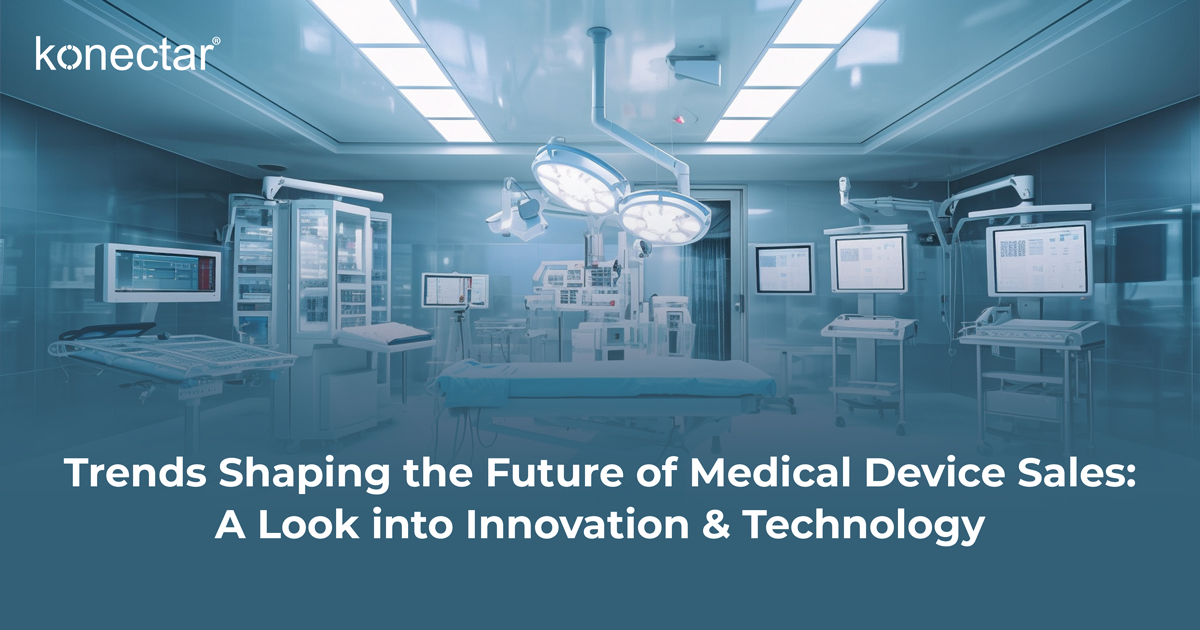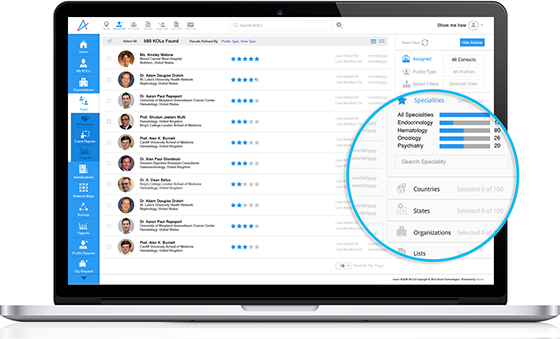11 Jan 2024
Trends Shaping the Future of Medical Device Sales: A Look into Innovation and Technology

In this article:
The COVID-19 pandemic brought significant challenges for medical device sales teams. Restrictions on in-person interactions and limited access to healthcare professionals, KOLs (Key Opinion Leaders) responsible for making crucial decisions, and other stakeholders of the medical community posed potential obstacles to sales efforts. As pandemic restrictions eased, there was a notable shift in how sales were conducted. Despite team sizes shrinking, there was a necessity to expand into new territories.
The pandemic accelerated the adoption of innovative sales approaches. Adapting to these changes, including integrating digital communication strategies, is crucial for the ongoing success of sales teams in the present era and future success in this utterly competitive and dynamic market.
Current landscape of the medical device sales
Let's look at the medical device market size globally. In 2022, the global market for medical equipment had a valuation of $512.29 billion, and it is anticipated to reach $799.67 billion by 2030. Also, more people are undergoing diagnostic and surgical procedures owing to the growing incidences of chronic diseases and healthcare professionals' emphasis on early detection. Moreover, the demand for advanced healthcare equipment has increased research and development investments in recent years. This has triggered the sales of new devices in the market.
Rapid economic growth in markets like China, India, and Brazil, coupled with increased healthcare spending, offers significant opportunities for device manufacturers to expand their market presence and boost sales.
The medical equipment market can be categorized into different types of devices, including Respiratory Devices, Cardiology Devices, Orthopaedic Devices, Diagnostic Imaging Devices, Endoscopy Devices, Ophthalmology Devices, and others, each serving specific purposes in healthcare.
In terms of users, these devices are utilized in various settings such as Hospitals and Clinics, Ambulatory Surgical Centres, Home Healthcare, and other places where medical care is provided.
Emerging trends in the medical device sales
It is essential to consider the following to anticipate the emerging landscape of medical sales and establish forward-thinking goals. Firstly, the global increase in the elderly population is influencing higher healthcare spending. This demographic shift leads to a greater need for prescription medications, mobility aids, and various medical supplies, offering Medical Device sales reps a unique opportunity to cater to these evolving needs.
Simultaneously, the impact of the aging population is not confined to the United States but extends globally, creating a rising demand for healthcare devices and supplies in developing nations. This presents salespeople with new territories and customers.
Another important trend is the growing popularity of devices, ranging from insulin pumps to advanced monitoring tools. Technological Advancements are making these devices more precise, smaller, and affordable, leading to a rise in demand and increased sales quotas for representatives specializing in this field.
Furthermore, advancements in robotic technology and artificial intelligence are transforming the field of surgical tools, enhancing safety and efficacy. This is opening up new opportunities for salespeople in the surgical tools and biotechnology sectors as healthcare professionals seek to adopt cutting-edge technologies.
How does AI enhance sales strategies and customer interactions?
The medical device sales process is undergoing a revolutionary transformation, integrating Artificial Intelligence (AI) and Machine Learning (ML) technologies. AI equips sales reps with tools for seamless virtual engagement. Through AI-driven platforms, reps can conduct dynamic virtual product demonstrations, ensuring that key features are effectively communicated in a compelling manner, even in remote settings. Some AI-based platforms help analyze the historical data on healthcare professionals. This enables reps to tailor discussions to individual clinician preferences, fostering impactful and customized virtual interactions.
AI's ability to facilitate customer segmentation and personalization is another key aspect of its impact. Sales strategies can be finely tuned to specific customer segments, ensuring personalized interactions that align with individual preferences. This level of customization strengthens customer relationships and enhances the relevance of sales engagements.
Dynamic pricing strategies are revolutionized by AI algorithms that consider market dynamics, competitor pricing, and customer behavior. This ensures adaptive pricing models, striking a balance between competitiveness and profitability in the device sales landscape.Automated lead scoring is streamlined through AI, enabling sales teams to prioritize efforts on leads with a higher likelihood of conversion. This automation enhances the efficiency of the sales funnel, focusing resources where they are most likely to yield positive outcomes.
In terms of customer engagement, AI-powered chatbots play a pivotal role. These virtual assistants provide instant responses to queries, deliver product information, and guide customers through purchasing. This real-time engagement contributes to a seamless and responsive customer experience.
Considerations for sales professionals to stay competitive
Staying competitive in this field requires a strategic approach. The following considerations are crucial for sales professionals seeking to excel in this ever-evolving industry:
-
Continuous Learning
Embracing a commitment to continuous learning is imperative. Remaining updated on the Digital Advancements in Healthcare devices, industry regulations, and sales methodologies is key. Attending workshops, webinars, and industry conferences facilitates a comprehensive understanding of the evolving landscape.
-
Digital Literacy
Developing a strong foundation in digital literacy is essential. Proficiency in using technological tools, Customer Relationship Management (CRM) systems, and other Digital Platforms is increasingly critical. Keeping abreast of emerging technologies relevant to medical equipment ensures adaptability.
-
Customer-Centric Approach
Understanding the unique needs and challenges healthcare professionals and institutions face is paramount. Tailoring the sales approach to prioritize customer satisfaction fosters long-term relationships.
-
Networking
Cultivating a robust professional network is a strategic asset. Participating in industry events, engaging in online forums, and seeking opportunities to connect with peers, healthcare professionals, and key stakeholders contribute to a well-established network, providing valuable insights and collaboration opportunities.
-
Effective Communication
Honing communication skills is a key aspect of success. Clearly articulating the value propositions of healthcare equipment and adapting communication styles to resonate with diverse audiences is crucial. Developing concise and compelling messaging that addresses specific needs enhances effectiveness.
-
Time Management
Prioritizing effective time management is essential. The demands of medical equipment sales necessitate efficient allocation of time. Developing strategies to streamline routine tasks allows for more focus on strategic activities such as relationship-building and customer engagement.
Adhering to these considerations equips sales professionals with the skills and mindset needed to navigate the competitive landscape successfully. Continuous learning, digital literacy, customer-centricity, networking, effective communication, and efficient time management collectively contribute to sustained success in this dynamic and challenging field.
FAQs
-
What skills are crucial for medical device sales professionals to successfully navigate in this dynamic field?
Essential skills for success include in-depth product knowledge, adaptability to industry changes, effective communication, relationship-building expertise, technical proficiency, and strong negotiation skills.
-
How can one become a medical device sales rep?
One must acquire a relevant degree, gain industry knowledge, accumulate sales experience, and build a professional network through industry events and forums.
-
How can sales professionals build strong customer relationships in virtual settings?
Building strong customer relationships in virtual settings involves leveraging technology for personalized communication, conducting virtual product demonstrations, actively engaging in online forums, and maintaining consistent and transparent communication to foster trust and understanding.






